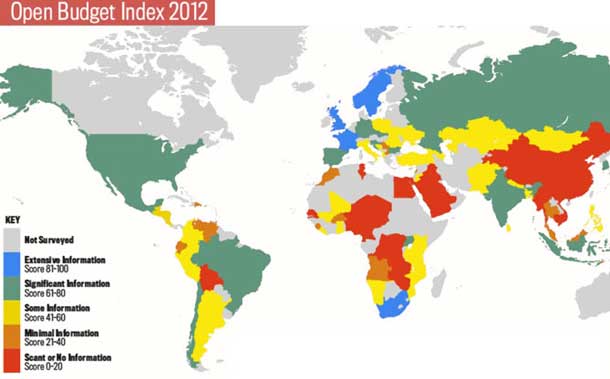Last week I attended a forum on Open Budgets conducted by the Institute of Economic Affairs (IEA)-Kenya. The Institute of Economic Affairs presented the 2012 Open Budget Report under the theme ‘Open Budgets Transform lives’. ‘The Open Budget Survey measures the state of budget transparency, participation and oversight in countries around the world. It consists of 125 questions and is completed by independent researchers in the countries. Ninety-five of the questions deal directly with public availability and comprehensiveness of eight key budgetary documents that governments should publish at various points of the budgetary cycle. The remaining 30 questions relate to opportunities for public participation in the budget process, and to the roles played by the legislature and supreme audit institutions in budget formulation and oversight. The survey does not reflect opinion. It measures observable facts related to budget, accountability and participation’ (Source: International Budget Partnership).
The importance of open budgeting cannot be underscored, but the highlights of open budgeting are; open budgeting can expose corruption and lead to more efficient and effective government spending, open budgets help match national resources with national priorities, open budgets support government, efforts to manage debt, open budgets help governments secure cheaper international credit, open budgets can help governments build trust with their citizens and give citizens voice and dignity.
The open budget survey enumerates the roles of key players in budget transparency and reporting, the players include; the executive, the legislature, the Officer of the Auditor General, civil societies and donor agencies.
The importance of Open Budgets and open budget systems cannot be underscored. And as I soon came to discover, African countries with the exception of South Africa had, and still have particularly poor Open Budget Index scores. South Africa has an OBI (Open Budget Index) score of 90 and ranks second on the OBI scale.
The other African countries fared badly; from the top of the of the OBI scale, African countries scored; Uganda 65, Namibia 55, Malawi 53, Ghana 50, Botswana 50, Kenya 49. African powerhouse Nigeria scored 19 on the OBI scale. At the bottom of the tier in budgetary transparency were; Equatorial Guinea 0, Benin 1, Chad 3, Niger 4, Zambia 4 and Rwanda 8.
Veritable correlations could be made between countries with significant oil and extractive industries with appalling OBI scores, in Africa and the world over. In Africa, Equatorial Guinea, Africa’s copper powerhouse Zambia, Tunisia, Algeria, Egypt and the Democratic Republic of Congo occupy the lower echelons of budget transparency, the only exception to this rule being South Africa.
Correlations on social, economic, civil and political liberties could be made on the OBI scale, with countries with notoriety in social, economic, civil and political liberties and rights scoring very poorly on the OBI index. Some particular countries in the above category in Africa include; Myanmar 0, China 11, Bolivia 12, and Angola 28.
The Open Budget Survey enumerates the roles of key players in contributing to budget openness. The Open Budget Survey proposes that donors should; play a more important role in promoting budget transparency, establish clear benchmarks and incentives for recipient governments to open their budget processes. Incorporate transparency, public participation and oversight components, through training or technical assistance to promote budget reforms. It also proposes that civil society should work together, redouble their efforts to demand greater transparency as well as formal spaces for public participation. As well as work with other relevant actors, (media, legislatures, audit institutions, donors) to create more incentives for governments to become more transparent.
The entire data sets, graphs and literate on the 2012 Open Budget Survey can be found here.
Alex Ndungu


